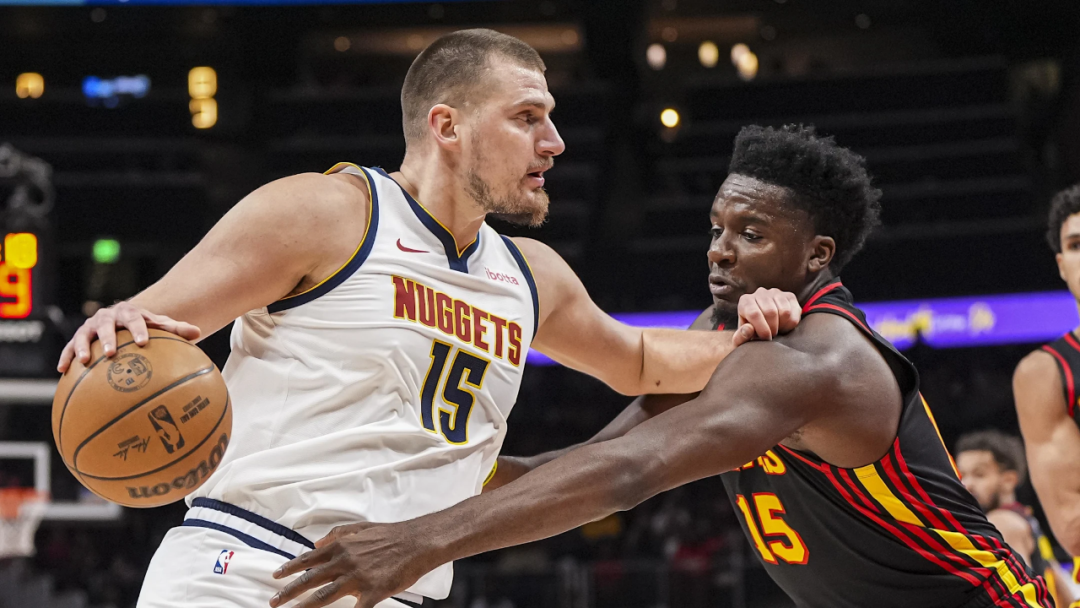The Nuggets finally won, crushing the Hawks 141-111 to sit at 12-10 and ninth in the West.
This win was no easy feat—their second game of a back-to-back. In the prior matchup, Jokic dropped 56 points and 16 rebounds, but the Nuggets shockingly lost to the Wizards. Jokic, rarely one to snap, half-joked: “In my country, if you play like that, your salary might get cut. Maybe we need to try that here.”
This is the NBA, so no salary cuts. Jokic had to carry the load himself, torching the Hawks for 48 points and 14 boards in 35 minutes. With Atlanta ice-cold from deep (9-of-40 from three), the Nuggets cruised to a 30-point blowout. Over the back-to-back, Jokic tallied 104 points, 30 rebounds, and 16 assists—the first player in history to do so.
In the past four seasons, Jokic has dominated, winning three regular-season MVPs and one title. This year, through 18 games, he’s averaging 31.4 points (2nd in the league), 13.6 rebounds (1st), and 10.3 assists (2nd).
Beyond these records, there’s another: in his first nine seasons, Jokic never had an All-Star or All-NBA teammate. Based on current Nuggets production, that streak will extend to a tenth season—and possibly his entire career—if Denver doesn’t change course.
Jokic isn’t a flashy, viral star, so his true value is underrated. Many say the Nuggets are wasting his prime, but that’s an understatement: they’re squandering a once-in-a-lifetime chance to build a historic dynasty.
GM Calvin Booth said early this season that Jokic’s title window lasts “about a decade.” Five years in, they have one ring, and their margin for error is shrinking. Sadly, Booth talks a big game but acts clueless—just a corporate bureaucrat in sports.
Jokic is the ultimate team player. For a decade, he’s sat at the same locker, quit social media years ago, never pressures management, and never questions teammates—even after their worst games. At 7’0″ and 285 lbs., he logs 37.7 minutes per game (1st in the league), doing whatever it takes.
In life, the squeaky wheel gets the grease. The quiet ones get ignored. Booth claims he wants to lighten Jokic’s load, but we all know the truth: “Don’t bully the nice guy” is just lip service; bullying is the norm.
The Booth-led front office claims it’s stuck in a tough spot.
They cry poverty. Owner Stan Kroenke, who owns multiple pro teams, is focused on Premier League’s Arsenal and refuses to push the Nuggets’ payroll past the second luxury tax apron. Without Jokic’s title hopes, Denver wouldn’t pay luxury tax at all.
They play the victim. Denver’s a small market; stars don’t want to come. For 15 years, Carmelo Anthony forced his way out, Andre Iguodala left for Golden State—so the Nuggets overpay to stay competitive.
In short, they blame the environment: “What can we do? Just ask Jokic to tough it out.”
But the real problem isn’t the market—it’s a spineless front office hiding behind Jokic’s kindness to mask its blunders.
1. Terrible Negotiations: Picking on the Weak
This summer, Denver had two extensions:
- Jamal Murray got a 4-year, $208M max. Next season, he’ll make $50M.
- Aaron Gordon signed a tricky 1+3 deal: he exercised his 2025-26 option, then got a 3-year, $102M extension, saving Denver $60M in luxury tax.
Gordon’s a team player—tight with Jokic, hard-working, and willing to sacrifice for a ring. Murray’s different: when his agent pushed, Booth caved.
Murray has played 17 games this season: 17.8 PPG, 4.0 RPG, 6.2 APG, 33.3% from three. In the past five seasons, he’s played 74 games max. At 27, it’s questionable if he’ll maintain this level—let alone improve.
If Booth had backbone, he could’ve denied Murray the max or delayed the extension. Murray’s leverage? As a free agent, Denver would still be over the cap, risking a loss. But Booth ignored the bigger picture: next summer, only teams like Brooklyn and San Antonio can offer max deals, and none will risk it on an injury-prone guard.
2. Botched Contracts: Shooting Themselves in the Foot
Most judge GMs by big trades or draft steals, but for small-market teams, avoiding mistakes matters more. Denver failed miserably this summer:
- They used the mid-level exception ($5M) on Dario Saric, who was waived by Golden State and had zero offers. Worse: it’s a two-year deal with a player option next season.
- Russell Westbrook’s minimum deal is also two years, player option year two.
- Murray’s contract has no playtime clauses, ending with a player option.
- Vlatko Čančar’s deal was panned, but beyond the $8M salary, it ends with a player option too.
Denver also had trade chances—rumors linked them to Paul George—but Booth refused to part with rookies like Julian Strawther or Kenneth Lofton Jr., killing talks. They chase pennies while risking dollars.
The Nuggets talk up “building around Jokic,” but their moves say otherwise. Jokic is their ticket to greatness, yet they ignore his needs, even harm his chances.
Must the nice guy always suffer?
